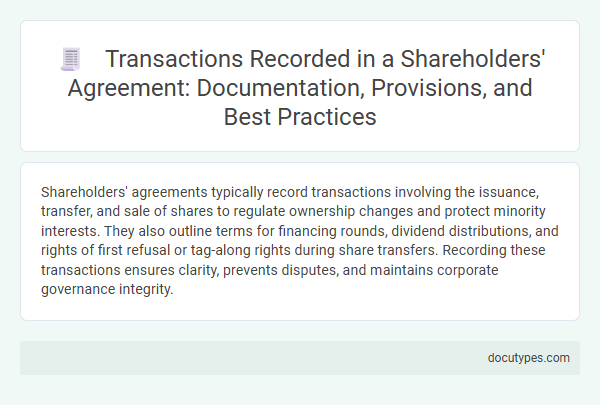Shareholders' agreements typically record transactions involving the issuance, transfer, and sale of shares to regulate ownership changes and protect minority interests. They also outline terms for financing rounds, dividend distributions, and rights of first refusal or tag-along rights during share transfers. Recording these transactions ensures clarity, prevents disputes, and maintains corporate governance integrity.
Overview of Shareholders' Agreements and Transaction Documentation
Which transactions are typically recorded in a shareholders' agreement? Shareholders' agreements generally document key transactions such as share transfers, issuance of new shares, and the exercise of voting rights. These agreements provide a clear framework for managing ownership changes and maintaining control among shareholders.
How does transaction documentation in a shareholders' agreement benefit you? Properly recorded transactions ensure transparency and prevent disputes by clearly outlining rights and obligations. This documentation serves as a valuable reference for resolving conflicts and enforcing agreed terms.
Essential Transaction Provisions in Shareholders’ Agreements
Shareholders' agreements outline specific transactions that require recording to protect the interests of all parties involved. These agreements focus on essential transaction provisions to ensure clarity and enforceability within corporate governance.
- Share Transfers - Records of share transfers establish control over who holds shares and under what conditions transfers can occur.
- Capital Contributions - Documentation of capital injections secures agreed financial commitments from shareholders to the company.
- Dividend Policies - Provisions concerning dividend distribution define how and when profits are shared among shareholders.
Clear recording of these transactions in shareholders' agreements mitigates disputes and promotes transparent corporate operations.
Recording Share Issuances and Transfers
Shareholders' agreements meticulously record share issuances and transfers to maintain clear ownership rights. Accurate documentation protects the interests of all parties involved in the equity structure.
- Recording Share Issuances - The agreement specifies the procedures for documenting new shares issued to investors or founders to ensure transparency.
- Documentation of Transfers - It outlines the protocol for recording the transfer of shares between existing shareholders or third parties to maintain a clear ownership trail.
- Compliance and Authorization - The agreement requires that all issuances and transfers comply with company bylaws and obtain necessary approvals to validate transactions officially.
Capital Contributions and Funding Documentation
Shareholders' agreements specifically record transactions related to capital contributions, detailing the amount and timing of each shareholder's financial input. These provisions ensure clarity on share ownership percentages and prevent future disputes over funding obligations.
Funding documentation within the agreement outlines procedures for additional capital calls, loan agreements, or other financial arrangements among shareholders. Clear terms on capital contributions and funding protect stakeholders' interests and maintain the company's financial stability.
Dividend and Profit Distribution Clauses
A Shareholders' Agreement specifies which transactions are recorded to ensure transparent management of dividends and profit distribution. These clauses detail the rights and obligations of shareholders regarding the allocation of company earnings.
- Dividend Distribution - The agreement defines the timing, amount, and method of dividend payments to shareholders.
- Profit Allocation - It outlines how net profits are divided among shareholders based on their shareholding percentages or other agreed criteria.
- Restrictions on Distributions - The agreement may impose limits or conditions on profit distributions to protect company liquidity and shareholder interests.
Rights of First Refusal and Pre-emption Provisions
Shareholders' agreements commonly record transactions involving the transfer of shares, particularly focusing on Rights of First Refusal and pre-emption provisions. These clauses ensure existing shareholders have the opportunity to purchase shares before they are offered to external parties.
Rights of First Refusal give Your shareholders priority to buy shares under the same terms as third-party offers, safeguarding control within the group. Pre-emption provisions require any new share issuance to be offered first to current shareholders, preventing dilution of their ownership.
Documenting Buy-Sell and Exit Mechanisms
Shareholders' agreements document key transactions, including buy-sell arrangements and exit mechanisms, ensuring clear guidelines for ownership transfers. These provisions protect all parties by defining conditions under which shares can be sold or bought, maintaining business stability. Your agreement should explicitly outline these transactions to prevent disputes and provide a structured exit strategy.
Dispute Resolution and Enforcement of Transaction Terms
A Shareholders' Agreement records specific transactions such as share transfers, capital contributions, and exit events to ensure clarity and legal compliance. Dispute resolution clauses detail the methods for handling conflicts, often including negotiation, mediation, or arbitration to avoid lengthy litigation. Enforcement of transaction terms is critical, providing mechanisms to uphold agreements and protect Your interests effectively.
Regulatory Compliance in Shareholder Transaction Records
| Transactions Recorded in a Shareholders' Agreement | |
|---|---|
| Share Transfers | All share transfer transactions involving existing or new shareholders must be documented. This includes sales, gifts, or inheritance of shares. |
| Issuance of New Shares | Records must capture issuance events, detailing the number, value, and recipients of new shares to maintain transparency and shareholder equity. |
| Shareholder Loans and Advances | Loans or financial advances provided by shareholders to the company are to be recorded, ensuring clear terms and repayment conditions. |
| Regulatory Compliance in Shareholder Transaction Records | |
| Adherence to Securities Laws | Transactions must comply with relevant securities regulations, such as disclosure requirements under the Securities Act, to avoid legal penalties. |
| Accurate and Timely Reporting | Maintaining up-to-date transaction records is crucial for audits and filings with regulatory authorities, ensuring your company meets all statutory deadlines. |
| Transparency Requirements | Shareholders' agreements must provide clear documentation of transactions to uphold governance standards and protect stakeholder interests. |
| Data Privacy Compliance | Recording shareholder transactions must respect data protection regulations to safeguard personal information involved in the agreements. |
Which Transactions Are Recorded in a Shareholders’ Agreement? Infographic

